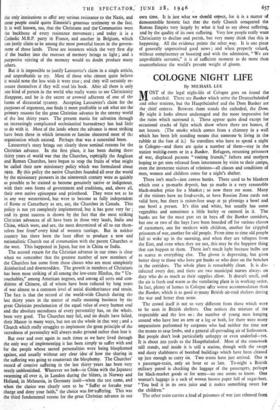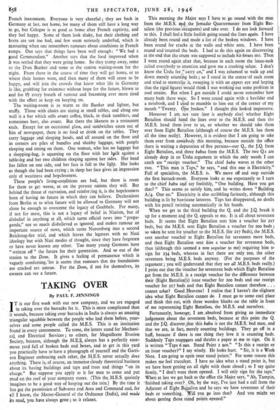COLOGNE NIGHT LIFE
By MICHAEL LEE
MOST of the legal night-life of Cologne goes on found the cathedral. There are Bunker which serve the Deutzerbahnhof and other stations, but the Hauptbahnhof and the Dom Bunker are the chief centres. Between them stands the cathedral, the Dom. By night it looks almost undamaged and the more impressive for the, ruins which surround it. These appear quite dead except for occasional cracks of light which show where there are homes, if not houses. (The smoke which comes from a chimney in a wall which has been left standing means that someone 'is living in the rubble at the foot of it.) So travellers who have to spend a night in Cologne—and there are quite a number of them—stay in the station waiting-room or in a Bunker. Refugees, returning prisoners of war, displaced persons " visiting friends," fathers and mothers hoping to get sons released from internment by visits to their camps, even the inveterate visitors of relations—all classes and conditions of men, women and children come for a night's shelter.
There isn't much—just canvas bunks. There used to be blankets which cost a 50-marks deposit, but 5o marks is a very reasonable black-market price for a blanket ; so now there are none. Many of the visitors have no food-cards, or have Russian Zone cards not valid here, but there is ration-free soup at so pfennigs a bowl and one bowl a person. It's thin and white, but usually has some vegetables and sometimes a little barley or oatmeal in it. The bunks are for the most part set in bays off the Bunker corridors, but one or two of the bays have been boarded off for various classes of customers, one for mothers with children, another for crippled prisoners of war, another for old people. From time to time old people fail to wake up in the morning, and when they are refugees from the East, and even when they are not, this may be the happiest thing that can happen to them. There isn't much light because bulbs are as scarce as everything else. The gloom is depressing, but gives better sleep to those who have got bunks or who doze on the benches in the corridors. The whole place is remarkably clean. It is dis- infected every day, and there are two municipal nurses always on duty who do as much as their supplies allow. It doesn't smell, and the air is fresh and warm as the ventilating plant is in working order. In fact, plenty of homes in Cologne offer worse accommodation than the Bunker, which is as good at many British air-raid shelters during the war and better than some.
The crowd itself is not so very different from those which were to be seen in British shelters. One notices the mixture of the respectable and the less so ; the number of young men hanging around who have lost an arm or a leg or both, for there were many amputations performed by surgeons who had neither the time nor the means to save limbs, and a general all-pervading air of listlessness. But people don't look particularly unhappy or even underfed—yet. It is about 200 yards to the Hauptbahnhof. Most of the stonework still stands, and inside it is still a station, though with the swept and dusty shabbiness of bombed buildings which have been cleaned up just enough to carry Oh. Two trains have just arrived. One is a passenger-train, only an hour or so late. To-night a British military patrol is checking the luggage of the passengers, perhaps for black-market goods or for arms—no one seems to know. One woman's luggage is a sack of woven brown paper full of sugar-beet. " You boil it in its own juice and it makes something sweet for the children."' The other train carries a load of prisoners of war just released froth French internment. Everyone is very cheerful ; they are back in Germany at last, not home, for many of them still have a long way to go, but Cologne is as good as home after French captivity, and they feel happy. Some of them look shaky, but their clothing and boots are not too bad, and few seem seriously underfed, which is reassuring when one remembers rumours about conditions in French camps. One says that things have been well enough : " We had a good Commandant." Another says that the food improved when it was settled that they were going home. So they tramp away, some to the Dom Bunker and some to the station waiting-room for the night. From there in the course of time they will get home, or to where their homes were, and then many of them will cease to be happy, and will join the crowds that know what life in Germany is like, grubbing for existence without hope for the future, blown to and fro by every breath of rumour and becoming ever more tired with the effort to keep on keeping on.
The waiting-room is as warm as the Bunker and lighter, but stuffy. Those with chairs are sitting at small tables, and along one wall is a bar which sells ersatz coffee, black, in thick tumblers, and sometimes beer, also ersatz. But there the likeness to a restaurant ends. Except for an occasional glass, and sandwiches eaten out of bits of newspaper, there is no food or drink on the tables. They carry luggage and sleeping heads, and all around on the floor and in corners are piles of bundles and shabby luggage, with people sleeping and sitting on them. One woman, who has no luggage but a shopping-bag, is squatting on the floor with her beck against a table-leg and her two children sleeping against her sides. Her head has fallen on one side, and her face is full to the Egli). She looks as though she had been crying ; in sleep her face gives an impression only of weariness and hopelessness, These people's living-conditions are bad, but there is room for them to get worse, as on the present rations they will. But behind the threat of starvation, and reinforcing it, is the hopelessness born of having no future in which they can believe. Declarations from Berlin as to what future will be allowed to Germany will not alone be enough to overcome the legacy of. Goebbels. For many, if not for most, this is not a legacy of belief in Nazism, but of disbelief in anything at all, which turns official news into " propa- ganda," not so much disbelieved as ignored, and makes rumour an important source of news, which turns Nuremberg into a second Reichstag-fire trial, and which leaves the legatees with no Nazi ideology but with Nazi modes of thought, since they have forgotten or have never known any other. Too many young Germans have "written off " the future for their generation. And so out of the station to the Dom. It gives a feeling of permanence which is vaguely comforting, for it seems that rumours that the foundations are cracked are untrue. For the Dom, if not for themselves, its owners can see a future.































 Previous page
Previous page